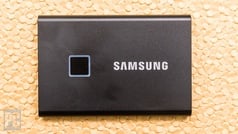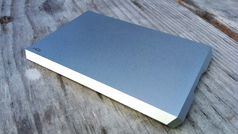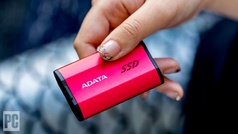
[ad_1]
The ADATA SE800 isn’t the cheapest external solid-state drive you can buy—its list price of $259.99 for the 1TB unit seen here comes out to 26 cents per gigabyte. (It’s a more reasonable 19 cents if you buy the gadget from Amazon, but that’s still not rock bottom.) On the other hand, the SE800 is practically indestructible: It’s a rugged SSD with an Ingress Protection rating of IP68, meaning it’s been certified both dustproof and waterproof to a depth of five feet for up to 30 minutes. It’s also very fast and at the same time incredibly sleek and compact (1.4 ounces, measuring 0.4 by 2.8 by 1.7 inches). Even better, ADATA includes the bells and whistles any drive reviewer hopes to see when checking out a new storage device, including dual USB cables so your USB-C and USB-A needs are covered without resorting to easy-to-lose adapters. It’s an easy Editors’ Choice among rugged drives.
An Almost Perfect Peripheral
The SE800’s brushed aluminum case, which comes in blue or black, contains an M.2 Type-2242 solid-state drive, formatted as exFAT by default. (The drive is easily reformatted and is compatible with Windows, Mac, Android, Linux, Xbox One, and PS4 devices.) Rubber ends protect the unit from dust and water; you simply remove the tabbed end to expose the USB-C port and an LED activity light.
When the drive is not in use, you reinsert the rubber end in order to ensure that the drive stays splashproof. That can be trickier than it sounds, so make sure to double-check that the end is completely flush with the edges of the drive if you’re taking it out in the field.
Similar Products
With the rubber ends in place, the ADATA is a MIL-STD 810G device that can withstand drops of four feet. (And why not? In addition to its internal shock protection, the drive weighs almost nothing and contains no moving parts.) As for being water-resistant, I dropped it into a pitcherful and let it sit for several minutes, with no ill effects.
The IP68 rating means the SE800 is a smidge more rugged than the equally good-looking but slightly more expensive CalDigit Tuff Nano. We’ve never seen an SSD with the only higher rating for consumer electronics waterproofing—IPx9, able to withstand high-pressure cleaning or a steam jet—so the ADATA has earned the highest ruggedization rating you’re likely to find in a consumer product.
The drive comes with a three-year warranty (a year longer than many) and a quick-start guide with contact info for support or questions, as well as instructions on downloading two useful utilities: OStoGo, which allows you to boot your operating system from the drive, and HDDtoGo, a suite that includes backup and encryption utilities.
Speed to Spare
Okay, the SE800 doesn’t really have speed to spare—after all, when it comes to data transfers, there’s no such thing as too much performance. But it’s plenty fast. We subjected the SSD to a series of benchmarks designed to stress the drive and to mimic real-world computing tasks. The SE800 came through, earning high marks in most of our tests.
One thing you’ll note: These drives all support the USB 3.1 Gen 2 interface, but only in some cases do they use PCI Express internals (drives, controllers, and bridging silicon) that allow for speeds faster than typical earlier external SSDs that rely on SATA drives, controllers, and bridges. Drives of the latter (SATA) provenance will typically see sequential reads and writes top out between 450MB and 550MB per second. (In our comparison set below, that would be the HyperX Savage EXO.) You’ll see this especially on the Crystal DiskMark tests when comparing drives with PCI Express and SATA innards.
BlackMagic 3.1 Disk Speed Test
The Mac-only BlackMagic drive testing utility was created by an Australian producer of video software and hardware, and is often used to help videographers gauge how a drive will perform when working with large video files. In this test, the ADATA turned in slightly slower read speeds than the Tuff Nano, Crucial X8, and SanDisk Extreme Pro. Its write speeds, though, were thoroughly competitive.
PCMag Drag-and-Drop Test
In our classic stopwatch test, we copy a 1.2GB test folder containing several different file types from our testbed PC to the external drive. This test offers a good real-world check on transfer speeds. The ADATA SE800 performed like a champ, matching the SanDisk SSD’s time of 2 seconds.
CalDigit’s Tuff Nano took 3.4 seconds to transfer the folder, while the HyperX Savage EXO required a leisurely 4 seconds.
PCMark 8
The PCMark 8 storage subtest measures a drive’s performance under typical workloads such as videoconferencing and word processing. Here, the SE800 actually finished last, but the five scores were so close that the difference between the ADATA and the top-scoring Crucial X8 was negligible.
Crystal DiskMark
Crystal DiskMark’s sequential read/write tests measure the performance of a drive as it reads and writes large contiguous blocks of data. Here, the ADATA SE800’s read score of 957MBps was top-notch, tying the Crucial SSD’s and nearing its advertised peak of 1,000MBps.
The SE800 did not fare as well in the Crystal DiskMark write test, managing 676MBps. The other drives, except for the HyperX, beat that result handily.
We Have a Winner
ADATA’s SE800 external solid-state drive is a surefire winner. The only negative we could find with this drive is that the supplied cables are quite short; this is not normally an issue when working with a laptop, but it could be an inconvenience if you mean to use it with a tower PC. Otherwise, this is a superb SSD. With its three-year warranty, dual USB cables, and downloadable utility software, it makes for a compelling purchase. It even boasts an activity light, a feature often left out by cost- and weight-conscious manufacturers. Add its speed, affordability, and diminutive size, and it’s truly hard to complain.
4.5

(Opens in a new window)
(Opens in a new window)
View More
The ADATA SE800 external SSD is everything you want in a shirt-pocket solid-state drive: sleek, tough, affordable, and snappy. It will make an excellent addition to your kit.
[ad_2]
Source link : https://www.pcmag.com/reviews/adata-se800












